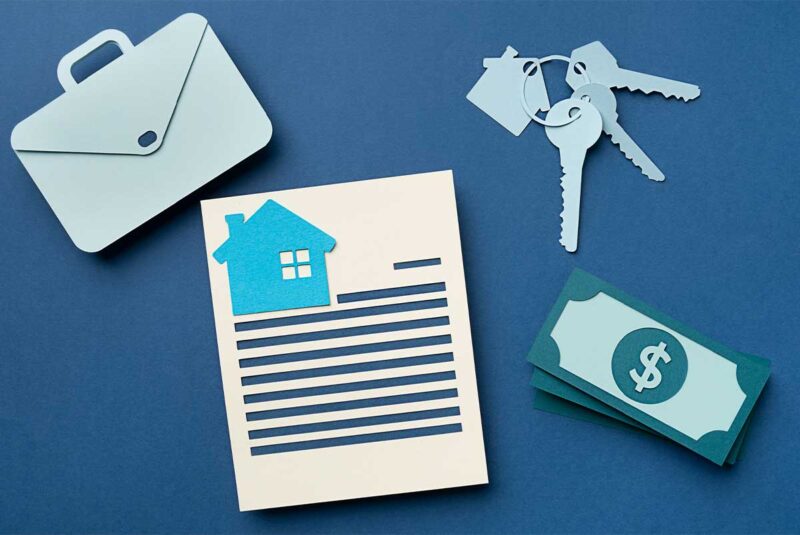Ready To Buy a Home?
Get Approved to Buy a Home
Rocket Mortgage® lets you get to house hunting sooner.
Buying a house comes with serious cash requirements. Saving up enough for the down payment and closing costs are some of the biggest obstacles new home buyers face.
According to data from the National Association of REALTORS® (NAR), the average closing costs were $6,905 in 2021.[1] Averages vary by state, but they’ve trended higher overall since then. So you aren’t alone if you’re looking for help covering those costs.
Lender credits are one way to afford closing. With lender credits, your mortgage lender covers your closing costs. In return, you pay a higher interest rate, which increases your monthly payment for the life of the loan.
We’ll explain how this process works in more detail and review an example to see how the payment structure changes.
How Lender Credits Work
Explore Your Mortgage Options
What are you looking to do?
Lender credits are calculated the same way as mortgage points. Sometimes, they’re referred to as “negative points.” One point equals 1% of your loan amount.
If you’re taking out a loan for $300,000, one point would be worth $3,000. Your lender could give you two points in lender credits, totaling $6,000 to cover closing.
In exchange for the $6,000, you’ll pay a higher interest rate, increasing your monthly payments. The more points your lender credits you, the higher your interest rate will be.
Your base interest rate, and how much the interest rate increases for each point the lender credits you, will vary from lender to lender based on their pricing structure. That’s why it’s a good idea to shop multiple lenders.
What lender credits can be used for
You can use lender credits to cover almost all of the usual closing costs, including:
- Title or mortgage insurance
- Attorney fees related to the deed transfer
- Prepaid property tax
- Prepaid homeowners insurance
- Lender fees related to the mortgage
- Inspections and survey costs
- Home warranty fees
What lender credits can’t be used for
You can’t use lender credits to cover an expense that’s required to qualify for a mortgage or finance a mortgage. This includes:
- The down payment
- Minimum borrower contributions
- Cash reserves required by the lender
When can lender credits be negotiated?
Lender credits are applied to your closing costs and alter the terms of your loan. This means they must be negotiated before you close. However, if you’re considering refinancing because interest rates have fallen, you can negotiate lender credits to pay for the closing costs of refinancing.
Need Mortgage Help?
New home, second home, refinancing, we’ve seen it all. Whatever your goals, expert help is just a click away.
Lender Credit Example
Let’s look at an example of how lender credits work. We’ll use a base mortgage of $300,000 with a 5% down payment.
| Without lender credits | With lender credits | |
| Mortgage loan amount | $300,000 | $300,000 |
| Estimated upfront closing costs | $9,000 | $0 |
| Interest rate | 6.0% | 6.75% |
| Estimated monthly mortgage payment | $1,799 | $1,946 |
| Estimated total interest paid over a 30-year mortgage (principal not included) | $347,515 | $400,486 |
In this example, the lender credits cover the $9,000 closing costs. The lender will raise your interest rate to offset that, which increases your mortgage payment by $147 per month.
Over the life of the loan, you’ll end up paying $52,971 more in total interest.
Breakeven point
Remember, you can come out ahead with lender credits, depending on how long you plan to stay in the mortgage – for example, if you sell your home within a few years.
For lender credits, the moment when the amount you saved on closing costs equals what you’ve paid in extra interest is known as your breakeven point. To calculate it, divide the total you received in closing costs by the extra you pay each month in higher interest.
In the example above, that would be 9,000 / 147 =61.22. That means you’ll pass your breakeven point after 62 monthly payments, or 5 years and 2 months.
Lender credits vs. mortgage points
Lender credits and mortgage points are often discussed together. Remember, lender credits can be called “negative points.”
However, mortgage points are the opposite of lender credits. You pay more during closing to buy down your interest rate for the life of the loan.
- Lender credits: You pay less upfront but get a higher interest rate, which means you pay more in interest over the life of the loan.
- Mortgage points: You pay more upfront but get a lower interest rate, which means you pay less in interest over the life of the loan.
How To Know if Lender Credits Are Worth It for You: Pros and Cons
We can’t stress this enough: lender credits aren’t free. It’s a calculated tradeoff to help make the upfront cost of buying a home more affordable.
If all of your available cash goes toward your down payment or other required expenses, lender credits can be the difference between closing on a home or not.
But if you can afford the closing costs, it may make sense to pay more upfront in exchange for a lower interest rate over the life of your loan.
PROS of lender credits👍
If you don’t have to wait because you’re saving for closing costs, you may be able to move into your dream home sooner rather than later.
Because you’re not paying the closing costs, you can put your cash toward other things. You might consider using it for immediate repairs or upgrades to the home, or you could keep some for an emergency fund.
If you plan on selling the house soon or refinancing the mortgage in a few years, the tradeoff on lender credits may work to your advantage.
CONS of lender credits👎
You accept a higher interest rate when you accept lender credits. This will increase your monthly payments for the life of the loan.
If you keep the mortgage long enough, you’ll eventually pay more in interest than you initially saved. It’s worth calculating the breakeven point to know when that threshold will be.
You can’t use lender credits for your down payment.
Alternatives to Lender Credits
If you’re not interested in lender credits, but you still need some help with your closing costs, there are other options to consider:
- Negotiate with the seller: Ask the seller to either pay for part of the closing costs or accept a slightly lower price on the home. Either option will free up some of your money at closing. However, this could be a difficult ask in a seller’s market.
- Apply for closing cost assistance: Try to apply for programs that help cover closing costs. First-time home buyers may find several available programs. Talk to your mortgage broker about grants and assistance programs in your area.
- Ask a family member for a gift: A relative can gift you money for closing costs – and potentially earn a tax break on the gift. Make sure to document the gift with a gift letter from the gift giver, showing where the money came from and that it’s a gift. Talk to your real estate agent or mortgage lender to learn more about using gift money.
- Bulk up your savings: Put off buying a house for a few months or a few years, so you can increase your savings and have more money to cover closing costs.
Lender Credit FAQs
Lender credits can’t exceed closing costs, usually 3% – 6% of the loan amount.
Lender credits allow the borrower to save the cash they would have spent on closing. This might let them purchase a home faster, or it might allow them to put cash toward repairs they otherwise may not have been able to afford, like a roof replacement.
It’s too late after you close on the loan. The reason is because the lender credit will change what you owe in closing costs and alter the loan terms. If you ever want to refinance, lender credits would be something you could negotiate at that time.
Yes. Accepting lender credits raises your base interest rate, a component in calculating the annual percentage rate (APR).
Lending a Helping Hand To Close the Deal
Lender credits are just one way you can reduce your upfront costs – and potentially some of the stress – when buying a home.
The Short Version
- With lender credits, your mortgage lender covers your closing costs, but you pay a higher interest rate on the mortgage, increasing your monthly payments for the life of the loan
- You can’t use lender credits for the down payment on a home purchase
- For lender credits, the moment when the amount you saved on closing costs equals what you’ve paid in extra interest is known as your breakeven point
National Association of REALTORS®. “View Average Closing Costs By State.” Retrieved May 2023 from https://www.nar.realtor/magazine/real-estate-news/stub-for-148570




